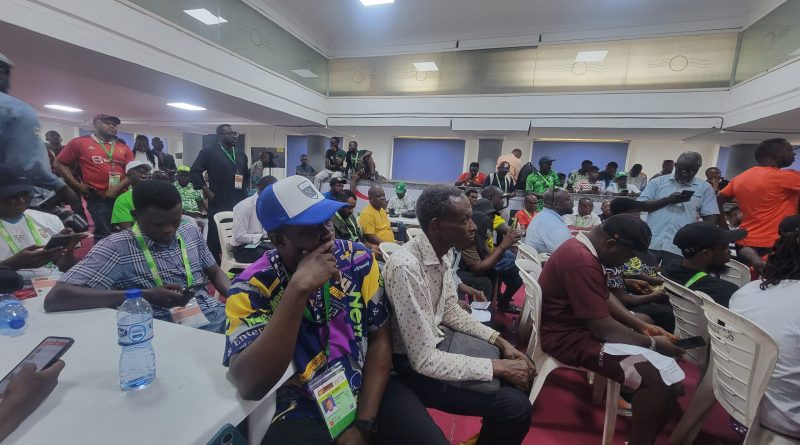Defend press freedom, review laws that criminalise journalism
The Nigeria Union of Journalists has asked the Bola Tinubu administration to defend press freedom and review laws that criminalise journalism in the country.
The NUJ stated this on Wednesday when its leadership met with Vice President Kashim Shettima at the Presidential Villa in Abuja.
Details of the meeting were provided by Mr Shettima’s spokesperson. Stanley Nkwocha.
In his speech, the NUJ President, Alhassan Abdullahi, urged Mr Shettima “to take a firm stance in defending press freedom, and ensuring that journalists are not punished for doing their constitutional duty.”
He also reportedly urged the government “to initiate a comprehensive review of colonial-era laws such as sections of the Criminal and Penal Codes that continue to criminalise journalism,” maintaining that “libel should be decriminalised.”
PREMIUM TIMES has reported several instances of violation of journalists’ rights by state agents, including the police and other security agencies. The Press Attack Tracker by the Centre for Journalism Innovation and Development has also documented several cases of attacks on journalists in the course of their work.
Mr Shettima, however, said the Tinubu administration was committed to defending press freedom.
“I want to assure you that this administration will do its best to promote, project, and preserve the interests of the journalism profession,” Mr Shettima said.
Read the full statement by Mr Nkwocha below.
The Vice President, Kashim Shettima, has assured the Nigeria Union of Journalists (NUJ) that the administration of President Bola Ahmed Tinubu remains an ally of the media and is committed to protecting and advancing the journalism profession in the country.
The vice president recalled that President Tinubu has long been supportive of the media and would not deviate from his consistent track record of upholding the integrity of the journalism profession in Nigeria.
Mr Shettima gave the assurance on Wednesday when he hosted a delegation of the NUJ leadership at the Presidential Villa, Abuja.
The vice president, however, noted that the government and citizens alike expect a lot from the media, emphasizing that the journalism profession stands almost at par with the judiciary.
According to him, journalists are expected to hold public officials accountable and adjudicate on issues of governance.
“In President Bola Ahmed Tinubu, you have a friend, an ally, and a proprietor who has been kind to the Nigerian media over the years.
“I want to assure you that this administration will do its best to promote, project, and preserve the interests of the journalism profession. You are the life wire of the nation — we can’t afford to muzzle you,” the vice president said.
Describing the media as the conscience of the nation, Mr Shettima stressed that authorities cannot afford to intimidate journalists, as they are indispensable to the survival of democracy in the country.
“Past generations of Nigerian leaders — from Herbert Macaulay to Nnamdi Azikiwe and even Obafemi Awolowo — were first journalists before they became political leaders,” the vice president recalled.
VP Shettima acknowledged the challenges facing the media industry, noting that several media organisations in Nigeria struggle to pay staff salaries and emoluments.
He appealed to the NUJ to remain hopeful, promising that President Tinubu would continue to support the union.
“Be rest assured that the President will render his support to your organisation. We cannot afford to allow the journalism profession to die,” he added.
Mr Shettima further noted that President Tinubu’s decision to remove fuel subsidies was made in the national interest, just as he reaffirmed the administration’s commitment to repositioning the Nigerian economy for the benefit of all citizens.
Earlier, the National President of the NUJ, Alhassan Abdullahi, drew the Vice President’s attention to some critical issues confronting journalists in the course of doing their job, urging him to use his office “to take a firm stance in defending press freedom, and ensuring that journalists are not punished for doing their constitutional duty.”
He also urged the government “to initiate a comprehensive review of colonial-era laws such as sections of the Criminal and Penal Codes that continue to criminalise journalism,” maintaining that “libel should be decriminalised.”
Other demands made by the NUJ President include facilitation of a national safety protocol for journalists, in collaboration with security agencies, to ensure that no reporter is harmed for simply reporting the news.
He also called for the government’s partnership with the media to initiate a media support framework, including training grants, soft loans, tax relief, and a targeted bailout for critical media institutions.
The NUJ also sought partnerships with TETFUND, universities, and international media institutes to uplift training standards across the profession, as well as the creation of a Permanent Government- Media Liaison Platform under the office of the vice president to foster regular engagement, clarify national policies, and prevent the vacuum breeding misinformation.
Mr Abdullahi pledged the support of the Nigerian press for President Tinubu’s development agenda, noting, however, that the press will always maintain the right to speak truth to power for the survival of democracy.
“We are institutional partners and would not be drowned in the false narratives that the media must be antagonistic to government. Same way we call out the government when we feel that certain issues are not clearly given the needed consideration, we also would be ready to applaud the government when things have been done right,” he added.
READ ALSO: INTERVIEW: Every journalist needs to write a book; Journalism historian Dayo Duyile
He commended the administration of President Tinubu over what he described as tangible efforts and firm support in key areas of national development, despite the economic headwinds facing Nigeria, just like many other nations.
Mr Abdullahi acknowledged that in less than three years, the administration has undertaken bold reforms targeted at stabilising the nation’s economy.
Stanley Nkwocha
Senior Special Assistant to The President on Media & Communications
Office of The Vice President

